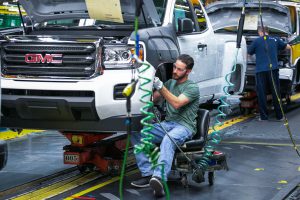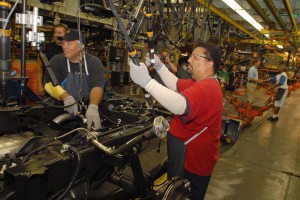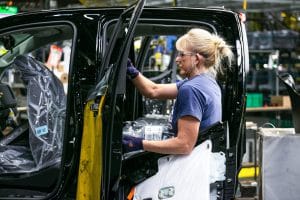
General Motors had five workers test positive for COVID-19, but said it plans to keep the plant open.
General Motors said Friday that it will not close its big assembly plant in Wentzville, Missouri, despite five workers there testing positive for COVID-19, the disease caused by the coronavirus. But the new outbreak – and the rising number of infections and deaths being reported around the U.S. adds to concerns about a possible “second wave” and its potential impact of an already hard hit auto industry.
Relying on hefty incentives and other moves to keep the market moving, U.S. auto sales didn’t fall quite as badly as had been expected during the near-nationwide coronavirus lockdown. Still, even the best-case scenarios envision the American market dropping to around 13 million, compared to the 17.1 million vehicles sold in 2019, and global demand is seen as dipping 20%, to around 70 million, for the full year, according to modeling by LMC Automotive, AlixPartners and others.
The biggest risk to the auto industry right now is “the level of uncertainty” surrounding the coronavirus pandemic and its potential impact on the economy, said Jeff Schuster, the senior industry analyst for LMC Automotive, during a web conference.
(Ford forced to temporarily shut down third, fourth plants due to COVID.)
On the positive side, auto sales didn’t tumble nearly as badly as was predicted back in March when the pandemic first started rolling across the country. While demand was off more than 40%, that was only about half of the decline many analysts were predicting. And May sales showed an even bigger rebound, according to industry data, with some forecasting June could be as little as 10% below pre-pandemic forecasts.
That said, there is little chance the industry will recover this year. LMC sees an optimistic number would be around 13 million for this year, in line with forecasts by the likes of IHS Markit and J.D. Power. Getting back to pre-pandemic numbers, cautioned Schuster, is unlikely to happen until closer to mid-decade.
One reason is the weakened economy, he said, with millions of Americans out of work. The federal government had to roll back a seemingly optimistic jobs report released last Friday, the real numbers about three points higher than the 13.3% unemployment rate first announced. And this week saw the addition of 1.5 million more jobless to the rolls.
“With those levels of unemployment, there has to be an impact,” Schuster said.
Then there’s the possibility of a “second wave” of infections that could force new plant closures or public lockdowns. While some, including U.S. Treasury Secretary Steven Mnuchin, see that as unlikely. such an assumption is starting to seem questionable.
(Two Ford plants hit by new COVID-19 cases; workers initially refuse to go back on line.)
As of Friday 21 states, as well as Puerto Rico have reported sharp upturns in COVID-19 cases. A number of those, including Texas, set new highs not only in infections but deaths. In Houston, officials now are considering reinstating restrictions that could include new lockdowns. In Arizona, state officials told hospitals to put themselves on an emergency footing.

Ford had to temporarily shut down its Chicago plant – again – less than 24 hours after it did the same at its Kansas City Assembly plant to conduct COVID-related cleaning protocols.
In Missouri, the GM Wentzville plant has now experienced the biggest outbreak of COVID-19 of any automotive factory since production lockdowns ended during the past month. As of Friday morning at least five infections were confirmed. The automaker said it would not shut the plant down, but officials with the United Auto Workers union warn that could be just a matter of time.
“Five to 10 cases (of coronavirus) is a yellow light, 10 to 20 cases is a red light,” UAW Local 2250 President Glenn Kage told the Detroit Free Press. “In my opinion, 20 is too many. That’s the number.”
Even if outbreaks proved to be limited enough not to force a full plant closure – or new public lockdown orders – even short-term disruptions of production to disinfect an assembly line could be problematic, warned LMC’s Schuster.
Right now, U.S. dealers have only about 2.6 million vehicles in inventory, fully 1.3 million less than they did in June 2019, and a nine-year low, according to LMC. Showroom stocks are particularly low when it comes to the high-profit pickups that remained in reasonably strong demand throughout the lockdowns. Anything that could slow production of new vehicles down could be seriously problematic.
“The risk is that supply might not be able to meet demand in the short-term,” said Schuster, further cutting into any sales rebound in 2020.
(Auto workers worried about returning to plants during pandemic.)
For the auto industry, a sales rebound is tentative, at best. Any number of issues could set the recovery on its heels. And with manufacturers expected to report a sharp slump in earnings for the rest of the year, even as they’ve accumulated massive new debt, the impact could be devastating.

